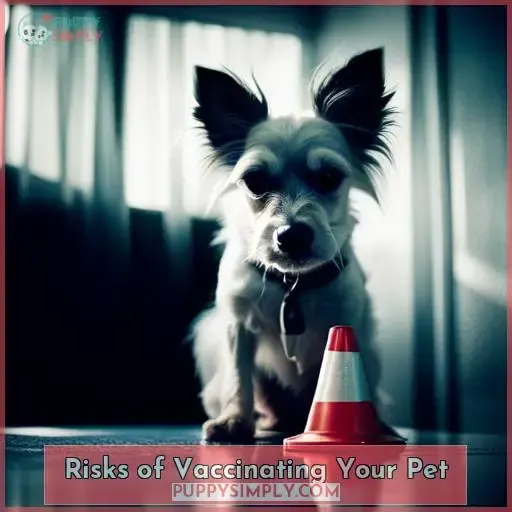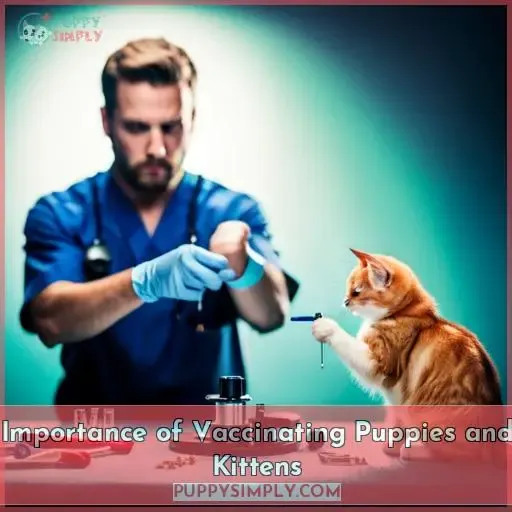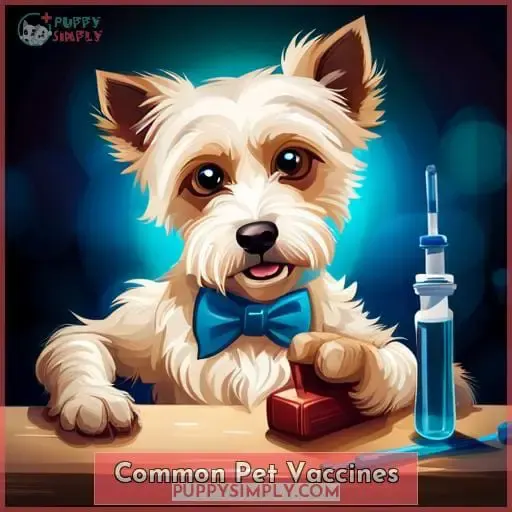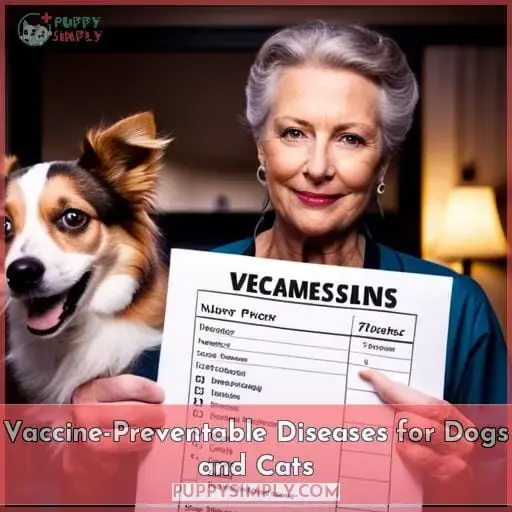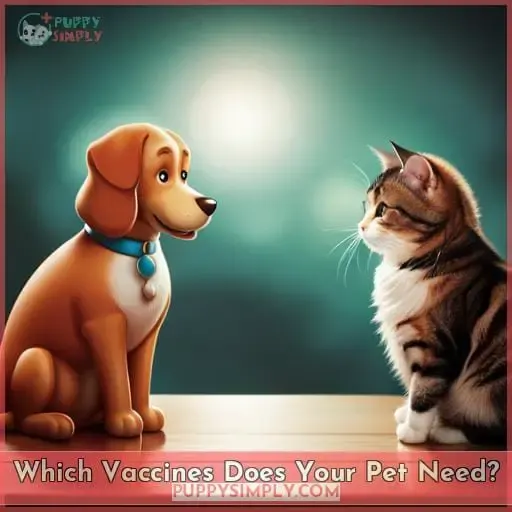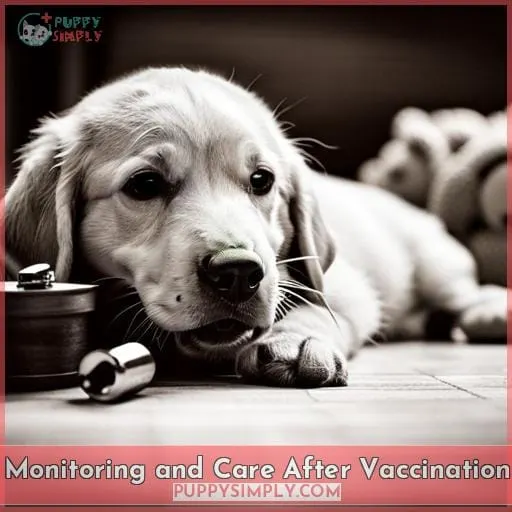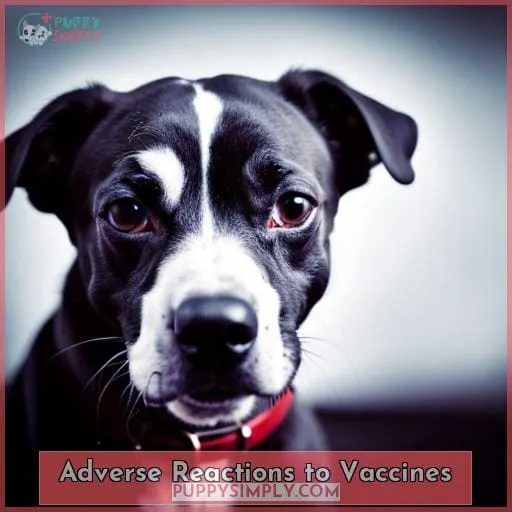This site is supported by our readers. We may earn a commission, at no cost to you, if you purchase through links.
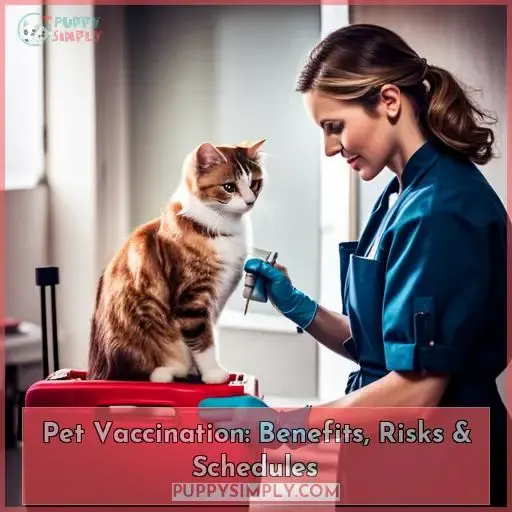 Looking to keep your furry friend healthy and protected? Pet vaccination is the way to go.
Looking to keep your furry friend healthy and protected? Pet vaccination is the way to go.
By vaccinating your pet, you can:
- Prevent diseases
- Save money on potential medical expenses
- Ensure the safety of both your pet and those around them
While there are some risks involved with vaccinations, they are far outweighed by the benefits.
Whether you have a puppy or an adult cat, understanding vaccination schedules is crucial for their well-being.
Table Of Contents
- Key Takeaways
- Why Vaccinate Your Pet?
- Benefits of Vaccinations
- Risks of Vaccinating Your Pet
- Importance of Vaccinating Puppies and Kittens
- Common Pet Vaccines
- Vaccination Schedules for Dogs and Cats
- Vaccine-Preventable Diseases for Dogs and Cats
- Which Vaccines Does Your Pet Need?
- Monitoring and Care After Vaccination
- Adverse Reactions to Vaccines
- Frequently Asked Questions (FAQs)
- Can vaccinations completely guarantee that my pet will never get sick?
- Are there any alternatives to traditional vaccinations for pets?
- Can my pet have an adverse reaction to a vaccine even if they have had it before without any problems?
- Can my pet receive multiple vaccines at the same time?
- Are there any vaccines that are recommended for all pets, regardless of their lifestyle or location?
- Conclusion
Key Takeaways
- Vaccinating your pet is crucial for protecting them against highly contagious and potentially deadly diseases.
- It is a cost-effective preventative measure that can save you money on potential medical expenses.
- Vaccinations not only protect your pet but also ensure the safety of those around them.
- Starting the vaccination series early for puppies and kittens helps stimulate their immune system and prepare them for viruses and bacteria.
Why Vaccinate Your Pet?
Vaccinations are essential for the health and well-being of your pet, as they protect against highly contagious and potentially deadly diseases.
Vaccines prevent diseases from spreading between animals and even to people.
By vaccinating your pet, you can avoid costly treatments for preventable illnesses.
Diseases such as distemper, heartworm, kennel cough, and rabies are all vaccine-preventable.
These vaccines provide a crucial shield of protection that helps keep your furry friend safe from harm.
Ensuring that your pet is up-to-date on vaccinations not only safeguards their health but also contributes to the overall wellbeing of the animal community by preventing disease transmission among pets.
Benefits of Vaccinations
Vaccinations for your pet offer a range of benefits.
First, they provide crucial protection against highly contagious and potentially deadly diseases. By vaccinating your pet, you can prevent many illnesses that could otherwise require costly treatments.
Additionally, vaccinations help protect both animals and people from the spread of diseases that can be transmitted between them.
Disease prevention through vaccination.
By vaccinating your pet, you can prevent the occurrence of diseases and ensure their overall health and well-being.
Vaccinations provide protection against contagious and deadly diseases, offering a cost-effective preventative measure for pets.
Cost-effective preventative measure.
Vaccinating your pet is a cost-effective preventative measure that can save you money in the long run.
By getting your dog or cat vaccinated, you can prevent costly treatments for preventable diseases and ensure their health and well-being.
Protection for pets and people
Ensure the safety and well-being of both your furry companion and yourself by protecting them through pet vaccinations.
Vaccinations provide immunity, disease prevention, and lifelong protection for pets. It’s a safe, effective, and cost-effective way to ensure their health and save on potential medical expenses.
Risks of Vaccinating Your Pet
While vaccinating your pet, it’s important to be aware of the potential risks and side effects associated with vaccinations.
- Allergic Reactions: Vaccinations can sometimes trigger an allergic reaction in pets, which may involve a localized or systemic response in their body.
- Sarcoma Development: In rare cases, cats may develop a type of tumor called sarcoma at the site of vaccination. This serious side effect highlights the importance of proper vaccine administration and monitoring.
- Vaccine Side Effects: Although uncommon, some pets may experience mild side effects such as lethargy, loss of appetite, or fever after receiving vaccines.
It’s crucial to discuss any concerns about vaccine safety with your veterinarian before making decisions for your pet’s health.
Importance of Vaccinating Puppies and Kittens
When vaccinating your puppies and kittens, it’s crucial to start their vaccination series early in order to provide them with essential protection against infectious diseases.
The immune system of young animals isn’t yet fully developed, making them highly susceptible to these diseases. Early vaccination helps stimulate their immune systems and prepares them to recognize viruses and bacteria that can cause harm.
By following the recommended puppy or kitten vaccine schedule, you’re ensuring that they receive the necessary shots such as distemper vaccine, parvovirus vaccine, and bordetella vaccine at appropriate intervals for optimal disease prevention.
This proactive approach not only promotes pet safety but also proves cost-effective by preventing expensive treatments for preventable illnesses later on.
Common Pet Vaccines
Now let’s discuss the common pet vaccines that are available for your furry friend.
There are two main categories of vaccines: core vaccines and non-core vaccines.
Core vaccines are recommended for all dogs and cats, providing protection against highly contagious or deadly diseases.
Non-core vaccines, on the other hand, are recommended based on individual risk factors such as lifestyle and geographic location.
It’s important to consult with your veterinarian to determine which vaccinations your pet needs for optimal protection throughout their life.
Core Vaccines
To ensure the proper protection of your pet, it’s important to understand the core vaccines that are commonly recommended for dogs and cats.
Here are four key facts about core vaccines:
- Core vaccines protect against diseases like distemper and parvovirus in dogs.
- Dogs can also receive a vaccine for kennel cough and canine influenza.
- Cats should be vaccinated against feline leukemia virus as part of their core vaccination protocol.
- Another important core vaccine for dogs is adenovirus, which protects against canine hepatitis.
Non-Core Vaccines
Now let’s talk about the non-core vaccines that are commonly administered to pets.
You should consider these vaccines based on your pet’s risk of exposure to certain diseases, such as their lifestyle or where they live.
Some common non-core vaccines include:
- Bordetella
- Canine influenza
- Feline leukemia
- Lyme disease
- Leptospirosis
- Adenovirus (CAV-2)
- Feline immunodeficiency virus (FIV)
- Parainfluenza
- Protection against ticks for dogs
Vaccination Schedules for Dogs and Cats
When it comes to vaccinating your pets, understanding the recommended vaccination schedules is crucial.
For puppies and kittens, they should receive vaccinations every 4 weeks starting at 8 weeks of age until they reach at least 16 weeks old.
As for adult dogs and cats, core vaccines are typically recommended unless there’s a medical reason not to vaccinate them.
It’s important to consult with your veterinarian about the specific vaccines and schedule that will provide optimal protection for your pet throughout their life.
Puppy Vaccine Schedule
As we continue discussing common pet vaccines, let’s delve into the puppy vaccine schedule, which outlines the recommended vaccinations for dogs during their early stages of life.
Puppies should receive vaccinations at 2, 4, 6, and 8 weeks of age. These initial doses help stimulate their immune system to produce antibodies that protect against diseases.
Adult Pet Vaccine Schedule
If your puppy has completed their initial series of vaccinations, it’s important to continue following an adult pet vaccine schedule to ensure continued protection for your dog.
Adult dogs should receive regular vaccinations against diseases such as rabies, distemper, parvovirus, and kennel cough.
The frequency of adult dog vaccines varies depending on the specific vaccine and the recommendations of your veterinarian.
It’s essential to discuss any potential side effects or risks with your vet before vaccinating your adult dog.
Additionally, consider factors like parasites and flea prevention when determining the overall healthcare needs of your pet.
Vaccine-Preventable Diseases for Dogs and Cats
Let’s now discuss some of the vaccine-preventable diseases that can affect dogs and cats.
These include:
- Rabies, a deadly disease that’s required by law to be vaccinated against;
- Distemper/adenovirus/parvovirus, which are highly contagious and can cause severe illness in puppies;
- Kennel cough and canine parainfluenza, common respiratory infections in dogs often seen in high-risk environments like boarding facilities or dog parks;
- Leptospirosis, a bacterial infection that can be transmitted through contaminated water sources.
Vaccinating your pets against these diseases helps protect them from potential harm and ensures their overall health.
Rabies
Continuing with our discussion on vaccine-preventable diseases, one that’s of utmost importance to protect your furry friend from is rabies. The rabies vaccine requirements, cost, side effects, and effectiveness should be considered when following the vaccination schedule.
Distemper/Adenovirus/Parvovirus
To protect your pet from the vaccine-preventable diseases of distemper, adenovirus, and parvovirus:
- Understand the incubation period and symptoms.
- Seek proper treatment if necessary.
- Prevent future infections through vaccination.
- Be aware of potential complications.
Kennel Cough and Canine Parainfluenza
Protect your dog against kennel cough and canine parainfluenza by ensuring they receive the appropriate vaccinations.
Kennel cough is highly contagious with symptoms including a persistent dry cough. The bordetella vaccine can help prevent this illness, but treatment options are available if your dog does contract it.
Prevention through vaccination is key to keeping your pet safe from kennel cough and its spread to other animals.
Leptospirosis
Leptospirosis is a bacterial infection that can be prevented through vaccination, protecting your pet from this dangerous disease. It causes symptoms in dogs and cats and requires treatment. Prevention measures are crucial to avoid transmission of the bacteria.
Which Vaccines Does Your Pet Need?
When it comes to keeping your pet healthy, knowing which vaccines they need is essential.
- Core Vaccines: These vaccines are recommended for all pets and provide protection against common and potentially life-threatening diseases such as rabies, distemper, parvovirus, and feline leukemia.
- Non-Core Vaccines: These vaccines are based on certain risk factors such as lifestyle or geographic location. Examples include vaccinations for Lyme disease or canine influenza.
- Age at First Vaccination: Puppies and kittens should receive their first set of vaccinations starting at 8 weeks of age to ensure early protection against infectious diseases.
- Frequency of Boosters: After completing the initial series of vaccinations, booster shots are needed either annually or every few years depending on the specific vaccine in order to maintain immunity.
By following a proper vaccination schedule tailored to your pet’s needs, you can greatly reduce the risk of illness while providing them with long-term protection.
Monitoring and Care After Vaccination
Now that you know which vaccines your pet needs, it’s important to understand how to monitor and care for them after vaccination.
After your pet receives their vaccinations, it’s crucial to keep an eye out for any potential side effects. While serious reactions are rare, some pets may experience mild symptoms such as lethargy or soreness at the injection site.
It’s also essential to keep your pet hydrated and offer them plenty of water after vaccination. Additionally, watch for any signs of swelling or discomfort around the injection site.
To make the experience more pleasant for your furry friend, give them treats and allow them time to rest and recover from their vaccine appointment.
Adverse Reactions to Vaccines
If your pet experiences any adverse reactions after vaccination, it’s important to seek immediate veterinary attention.
Adverse reactions to vaccines are generally rare but can occur in some cases. Here are three things you should know about adverse vaccine reactions:
-
Most vaccine reactions are mild and short-term:
- The majority of pets may experience mild symptoms such as lethargy, soreness at the injection site, or a slight fever after vaccination.
- These symptoms usually resolve within a day or two without any intervention.
-
Serious vaccine reactions are rare:
- While serious adverse events from vaccines can occur, they’re extremely uncommon.
- These severe reactions may include anaphylaxis (a severe allergic reaction), which requires immediate medical intervention.
-
Vaccine-related tumors in cats:
- In very rare instances, cats may develop sarcomas (a type of tumor) at the injection site following certain vaccinations.
- However, this risk is low and outweighed by the benefits of vaccinating against deadly diseases.
Remember that even though there might be potential risks associated with vaccinations for pets, the overall benefits far outweigh these risks when it comes to protecting them from dangerous diseases.
Frequently Asked Questions (FAQs)
Can vaccinations completely guarantee that my pet will never get sick?
Vaccinations can’t guarantee that your pet will never get sick, but they significantly reduce the risk.
Vaccines protect against contagious and deadly diseases, preventing illnesses and costly treatments while ensuring the well-being of both your pet and you.
Are there any alternatives to traditional vaccinations for pets?
If you’re seeking alternatives to traditional vaccinations for your pet, there are no substitutes that can provide the same level of protection. Vaccinations remain the most effective and reliable way to safeguard your furry friend’s health.
Can my pet have an adverse reaction to a vaccine even if they have had it before without any problems?
Yes, pets can have adverse reactions to vaccines even if they’ve had them before without any problems. While rare, allergic reactions and certain types of tumors (sarcomas) can occur.
Can my pet receive multiple vaccines at the same time?
Yes, your pet can receive multiple vaccines at the same time. This is safe and commonly done to ensure efficient protection against various diseases. Your veterinarian will determine the appropriate combination and schedule for your pet’s vaccinations.
Are there any vaccines that are recommended for all pets, regardless of their lifestyle or location?
Yes, there are core vaccines that are recommended for all pets regardless of their lifestyle or location. These vaccines provide essential protection against highly contagious and potentially deadly diseases.
Your veterinarian can guide you on which ones your pet needs.
Conclusion
To keep your furry friend healthy and protected, pet vaccination is essential.
[Keypoints]By vaccinating your pet, you can:
- Prevent diseases
- Save money on medical expenses
- Ensure the safety of both your pet and those around them.
While there are some risks involved, the benefits far outweigh them.
Understanding vaccination schedules and providing the necessary vaccines for your pet, whether they’re a puppy or an adult cat, is crucial for their well-being.
Make sure to consult with your veterinarian to determine which vaccines your pet needs.



